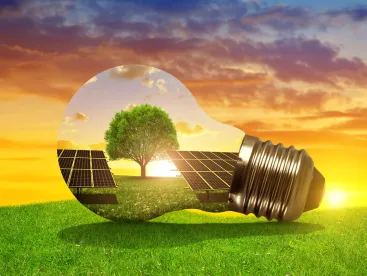During January’s lame-duck session the Illinois General Assembly enacted, and Governor Pritzker signed into law, HB 4412, which requires counties and municipalities to adopt statewide standards for utility-scale solar and wind facilities. This law requires local zoning authorities to rewrite their zoning ordinance within 180 days to match the standards set in the law and precludes them from adopting bans or moratoria on future approvals of these renewable facilities.
HB 4412 arose from Illinois’ aggressive renewable portfolio standard (“RPS”) program. The Illinois Climate and Equitable Jobs Act (“CEJA”) adopted in 2021 required Illinois to phase out private fossil fueled electrical generation by 2030 and municipal coal-fired power plants by 2045. CEJA required the state to be at 100% clean energy by 2050 with deadlines for 40% by 2030 and 50% by 2040. To meet those goals, CEJA more than doubled funding for the RPS and provided more than $40 million in funding for renewable initiatives.
The CEJA (along with enhanced federal incentives) had the desired effect of creating an avalanche of proposed renewable facilities. Developers proposed building the majority of these facilities in Illinois’ vast agricultural Downstate (i.e., the areas of the state outside the six county Chicago area), primarily due to the abundance of affordable land and interconnection opportunities. Conflicts have arisen, however, with local communities concerned about their agricultural character. While Downstate could experience increased prosperity from wind and solar lease and tax revenues, local farming communities have sought to preserve a measure of control over their agricultural lands. Recently, some Downstate counties and municipalities began to consider moratoria or outright bans on renewable facilities in an attempt to preserve local land use decision making.
Concerned that the local backlash to renewable projects could hinder CEJA’s ambitious renewables goals, the state adopted HB 4412 to limit the ability of counties and municipalities to make independent land use decisions in siting utility-scale renewable facilities. The law requires that local zoning authorities adopt a standard zoning ordinance that sets uniform allowable setbacks for solar and wind projects from surrounding houses and fish and wildlife areas. The law precludes local communities from adopting more stringent operational and decommissioning standards than those adopted by state agencies, such as the Pollution Control Board’s noise standards and the Department of Agriculture’s requirements in its Agricultural Impact Mitigation Agreements. It also precludes local communities from requiring renewable energy developers to construct earthen berm barriers or offer property value guarantees. The law establishes further standards for considering natural resources issues as well as limits on county and township road agreements.
HB 4412 also mandates process standards for zoning authorities, requiring hearings to be held no more than 45 days after a proposal is submitted and requiring final decisions to be made no more than 30 days after the last hearing. Zoning authorities cannot adopt moratoria or bans on approving renewable facilities, and all zoning decisions involving utility scale solar and wind projects must comply with HB 4412. Existing zoning ordinances that are inconsistent with HB 4412 must be revised within 120 days.
The law does not set out any specific penalties for failing to meet these deadlines, but it does state that a county may not place any restriction on a renewable facility unless it adopts an ordinance that complies with the law’s standards. Whether that means that a noncompliant county cannot impose any restrictions on new facilities or that it can only impose the restrictions in the law may well be the subject of future litigation.
While clearly a great boon to the renewable industry, the issues HB 4412 is intended to address are not going away. The state has nearly unlimited power to establish and limit authority of counties and municipalities, but the issues dividing the renewable energy and agricultural communities will persist and potentially be exacerbated by the state’s action. The law does not deprive individual landowners and local residents of their ability to bring private nuisance and other legal actions that could also be used to slow project development. Compliance with the law is also uncertain, as the deadlines both for adopting zoning ordinances and completing local approval are probably unrealistic considering the thinly staffed and voluntary nature of many Downstate governments. While HB 4412 may expedite and make zoning decisions more consistent in some communities, it will not eliminate the potential for conflict and delay in the local zoning process or bridge the differences between agricultural and renewable energy interests.




 />i
/>i

